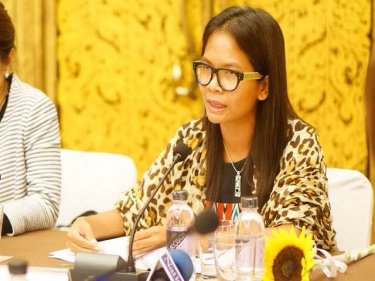National Broadcasting and Telecommunications Commissioner Supinya Klangnarong, who fought and won a long case involving a criminal defamation suit by Shin Corporation, said the action against her over the retweet showed that flaws in present laws were now being exploited more widely.
Yingcheep Atchanont, Advocacy and Campaign Officer, Internet Dialogue on Law Reform (iLaw), told the gathering that suing for defamation was now popular as a means of saving face among individuals and government agencies.
''These people should use the public sphere to resolve their disputes rather than resorting to the courts,'' he said. ''Police and prosecutors should be able to detect that these cases are a wrong use of the law and reject them immediately.''
It was blatantly unacceptable in the case of government agencies, he said: ''Individuals who feel offended can sue through the courts on their personal behalf.''
Human rights activist Pornpen Kongkajornkiert, facing a suit because she wrote an open letter to Prime Minister Prayuth Ong-chan alleging torture, said that there would be grave dangers if the knee-jerk reaction to sue became entrenched as part of Thai culture.
''It could quickly become a tool to stop the regular flow of information,'' she said.
Supan Rakcher, Deputy President of the Thai Broadcast Journalists Association, asked for a more open response to criticism.
''Authorities should not walk away from checks that are made by journalists or individuals,'' he said. ''I beg you, government officers, private individuals, to carry your criticism into the public arena, not the courts.''
Dr Durnden Nikomborrirak, of the Thailand Development Research Institute, said that without a Parliament to provide checks and balances, the work of journalists and rights advocates became even more important.
''Government agencies are never going to be able to check on each other,'' she said.
Phuketwan journalist Chutima Sidasathian told the conference that the pending closure of Phuketwan, the seizure of the passport of her colleague Alan Morison and a continuing campaign of intimidation by the Royal Thai Navy to hamper her reporting were all side effects of the inappropriate use of criminal defamation and the Computer Crimes Act.
The law reform seminar, attended by about 120 people, was NBTC Public Forum 5/2014.
Declaration of Interest: In July next year, Phuketwan journalists Alan Morison and Chutima Sidasathian face a continuing trial over criminal defamation and Computer Crimes Act charges brought by the Royal Thai Navy, citing a 41-word paragraph from a Pulitzer prize-winning Reuters report on the Rohingya boatpeople. Reuters and other news organisations in Thailand that published the same paragraph have not been charged. The charges were laid before the military takeover in Thailand.





.JPG)




Anyone with a PC or smartphone in Thailand will now have to think twice before they post or tweet as we know for certain that Big Brother is watching. Totally shameful when privacy goes out the window.
Posted by Pete on September 25, 2014 09:08